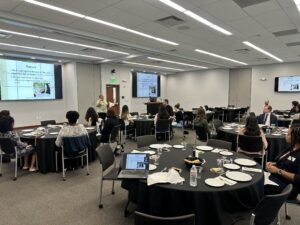Career Readiness Center’s etiquette dinner serves more than food

The primary focus of a business dinner is not the food. Yes, the 40 or so students who attended a recent etiquette dinner hosted by The University of North Texas Health Science Center at Fort Worth’s Career Readiness Center learned which fork to use and what to do with all the glasses on a table, but they also helped themselves build the kind of career readiness skills that could help them land a job one day.
The annual dinner was an opportunity for students, many of whom will soon be entering the workforce for the first time, to learn general tips and tricks for navigating a formal setting while sharpening their networking skills, dining etiquette and understanding of attire expectations.
Isabella Moon was one of the participants at the dinner. The second-year Texas College of Osteopathic Medicine student said she knew a lot of the etiquette already, but it was nice to have a refresher.
“I think because we got to practice a little bit at the etiquette dinner, it kind of cements it in your brain,” she said. “Once you also learn the theory of it all, a lot of the stuff becomes more logical.
“The setup is very ergonomic to make it intuitive so that once you start doing it, you can infer things from the setup — such as your water glass is always placed to your right so that you know it’s easily within your reach and you’re not trying to reach over your food and stuff like that. Once you sit down, those things kind of fall into place.”
Be strategic during a business meal
Business meals aren’t as straightforward as they seem. There’s strategy involved in every aspect, from what to wear to what to order.
Since the goal of the business meal is to build rapport, the food becomes secondary. One strategy, according to a recent Forbes article, suggests keeping the eating process simple.
 “Aside from the smartphone, nothing else distracts us from listening and connecting with others quite like struggling with a gristly steak or slurping ramen from chopsticks. Similarly, if you’re not sure about the etiquette of consuming a shrimp cocktail or escargot, the business discussion will surely be in danger of falling out of focus. My solution is to order a one-handed meal. Instead of scouring the menu for what sounds most delicious, skim it for what will be the least complicated to consume.”
“Aside from the smartphone, nothing else distracts us from listening and connecting with others quite like struggling with a gristly steak or slurping ramen from chopsticks. Similarly, if you’re not sure about the etiquette of consuming a shrimp cocktail or escargot, the business discussion will surely be in danger of falling out of focus. My solution is to order a one-handed meal. Instead of scouring the menu for what sounds most delicious, skim it for what will be the least complicated to consume.”
Etiquette dinners build comfort
First-year TCOM student Yosef Ansarizadeh, who also earned his master’s degree from HSC’s School of Biomedical Sciences, has now been through the etiquette dinner twice. He was recently at a conference in Austin where his learned etiquette skills helped him feel at ease.
“I was just grateful that I had attended the etiquette dinner in the previous year,” he said. “The instructor said that etiquette isn’t just about knowing where everything can be placed around the table. It’s about feeling comfortable and then just facilitating good interactions with other people. Since I didn’t have to deal with the confusion of being put into a situation with which I was entirely unfamiliar, I think I was able to just kind of exist in the moment and enjoy the company.”
Though learning to feel comfortable is a critical part of the training, the lessons of the etiquette dinner extend well beyond what happens during a meal, said Cassie Ardry assistant director of the Career Readiness Center.
“Learning and utilizing proper etiquette helps people feel more comfortable, seen and at ease because it shows that you care, value and respect others,” she said. “It displays that you respect relationships that you are currently forming. Etiquette promotes kindness, consideration and humility. These qualities are immensely beneficial as they help create stronger relationships.
“The ability to articulate and exhibit good manners and etiquette helps develop your critical life skills such as cultural humility, compassion, patience, respect, self-control, self-awareness, focus, decision-making and even problem-solving skills. Wholly, these qualities enhance critical life skills that will carry you further in your social and professional life. The Career Readiness Center prides itself on helping our HSC students and alumni in enhancing confidence in all these skills for career readiness competencies.”
Moon said she encourages others to participate in the dinner. She said in addition to learning valuable skills, the event acts as a dress rehearsal for
“When I get into an environment that might not be comfortable, like doing an interview dinner, I’ve already done it with people I know,” she said. “So now when I’m with people I maybe don’t know as well, at least I’m comfortable in the space, even if I’m not necessarily as comfortable with the people. I would highly encourage other students and prospective students to take advantage of that opportunity.”





Social media